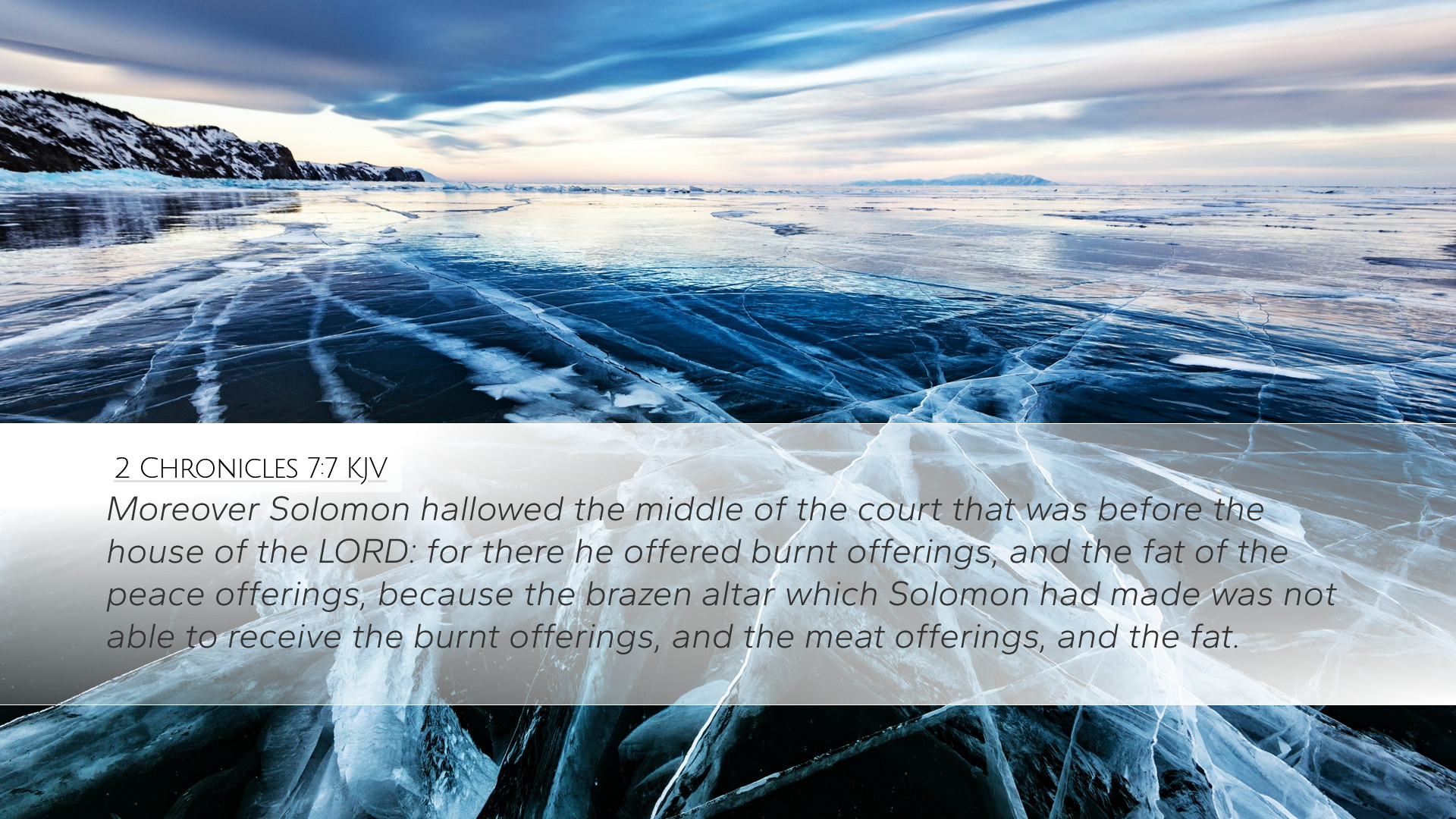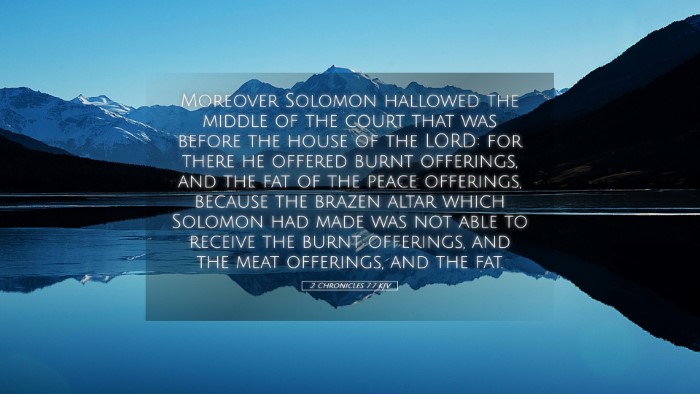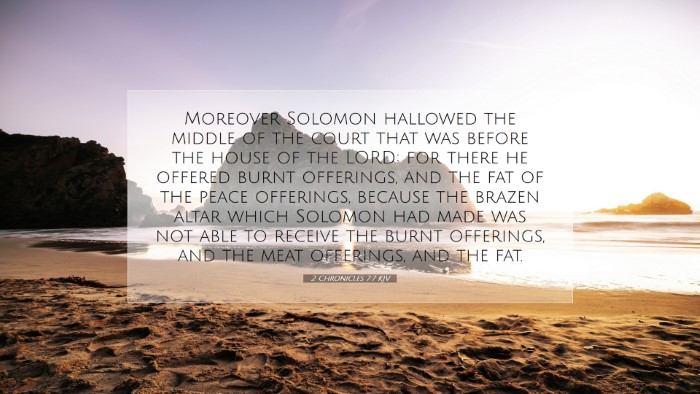Commentary on 2 Chronicles 7:7
Verse Reference: 2 Chronicles 7:7
"And Solomon hallowed the middle of the court that was before the house of the LORD: for there he offered burnt offerings, and the fat of the peace offerings, because the brazen altar which was before the LORD was too little to receive the burnt offerings, and the fat of the peace offerings."
Introduction
This passage captures a significant moment in Solomon's temple dedication. The act of hallowing the court and the associated sacrifices not only served as an expression of worship but also underscored the importance of God's house in Israel's life. This commentary synthesizes insights from public domain sources to provide a deeper understanding of this verse's historical, theological, and practical implications.
Historical Context
The events that lead to 2 Chronicles 7 occur shortly after the completion of Solomon's temple. Solomon had just been inaugurated as king, and his reign represented a pinnacle of Israel's national and spiritual life. The temple, as a dwelling place for God among His people, was central to Israel's identity. The sacrifices mentioned serve both to purify and dedicate the space and to facilitate communion between God and His people.
Matthew Henry's Insights
According to Matthew Henry, this act of hallowing the temple court signifies Solomon's recognition of the need for a sacred space for worship. He emphasizes the significance of the burnt offerings and peace offerings as acts of atonement and communion. The fact that Solomon needed to use the larger court indicates the abundance of worship and sacrifices that were to be made, reflecting a people's zeal for God.
Albert Barnes' Commentary
Albert Barnes highlights that Solomon's actions demonstrate the urgency and importance of worship in appropriate settings. The brazen altar, designed for sacrifices, could not contain the volume of worship, hinting at the spiritual hunger of the people. His commentary suggests that faith should lead to abundant acts of worship, and Solomon’s dedication is a testament to a thriving relationship between God and His people.
Adam Clarke's Observations
Adam Clarke recognizes the ceremonial importance of the sacrifices. He points out that the burnt offerings symbolize entire devotion to God, while the fat portions of peace offerings signify sharing the joy of communion with God. Clarke emphasizes the physical act of offering as deeply spiritual, noting that worship must engage the whole being - body, soul, and spirit - as an act of love and devotion.
Theological Significance
The temple serves as a type of Christ, foreshadowing the ultimate sacrifice for sin. The dedication of the court can be seen as a prelude to the future fulfillment in Jesus, who embodies the ultimate meeting point between God and humanity. Hence, this verse holds profound implications for understanding worship, sacrifice, and God’s abiding presence among His people.
Observations on Worship
- God-Centered Worship: Worship practices draw believers into a communal and reverent relationship with God.
- Symbolism of Sacrifice: The offering of sacrifices not only reflects the Israelite understanding of atonement but also points to the sacrificial nature of Christ, thus enriching the Christian understanding of worship.
The Role of the Leader
Solomon’s active leadership in worship underscores the role of leaders in guiding congregational worship. As pastors and theologians reflect on this verse, they may recognize the importance of initiating and facilitating worship experiences that are rich, meaningful, and centered on God. Like Solomon, leaders must prioritize and model heartfelt worship to inspire their congregations.
Consecration of Space
The act of hallowing a space reminds believers of the importance of physical locations for worship. However, it also emphasizes a broader theological reality: God desires to dwell within us. The physical act of worship is complemented by the spiritual readiness of the heart. Pastors may find encouragement to emphasize both sacred physical spaces and the readiness of their congregants' hearts for worship.
Applications for Today's Believers
In today’s context, this verse challenges believers to reflect on their own practices of worship. It prompts questions about how we prepare our hearts and spaces for encountering God:
- Preparation for Worship: Just as Solomon prepared the temple, believers are encouraged to prepare themselves, mentally and spiritually, for worship.
- The Importance of Sacrifice: Reflecting on the implications of sacrifice today, as believers are called to offer their lives as living sacrifices (Romans 12:1).
- Collective Worship Experience: Encouragement to engage in communal worship, recognizing the power of collective praise and devotion.
Conclusion
2 Chronicles 7:7 serves as an enduring reminder of the importance of worship, sacrifice, and communal devotion to God. The insights drawn from the commentaries of Matthew Henry, Albert Barnes, and Adam Clarke provide a rich tapestry of understanding for pastors, students, theologians, and Bible scholars. As these insights are contemplated and integrated into the life of the church today, the legacy of Solomon's dedication can inspire ongoing spiritual fervor among God's people.


